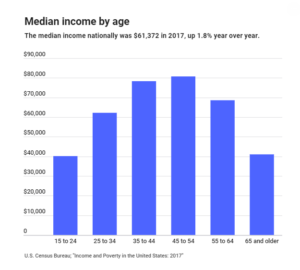
Most American households saw a modest pay boost last year.
The national median income was $61,372 in 2017, according to the latest data from the U.S. Census Bureau. Money coming into the typical U.S. household jumped 1.8 percent — $1,063 — year over year.
The data released this fall shows adults 45 to 54 years old remain America’s top earners, bringing in a median income of $80,671.

- 15 to 24 years: $40,093.
- 25 to 34 years: $62,294.
- 35 to 44 years: $78,368.
- 45 to 54 years: $80,671.
- 55 to 64 years: $68,567.
- 65 years and older: $41,125.
Young people were the only age group whose income dropped in 2017 compared with the year prior.
Teens and young adults saw a nearly 6 percent dip in money coming in compared with 2016. The median income for 15- to 24-year-olds fell from $42,551 in 2016 to $40,093 last year, according the Census Bureau.
Earning less can make sticking to a budget more important and putting cash aside for an emergency more difficult. Federal data shows younger people save less on average and have lower credit scores.
Asking for more money
While the median salary saw a modest increase from 2016 to 2017, most Americans didn’t see a pay boost in the past year: According to a recent Bankrate survey, 62 percent of Americans say they didn’t get a pay boost in the past 12 months.
In addition, young job seekers feel the most pressure to accept the first job offer they receive, likely cutting their earning potential, according to a survey released this month from ZipRecruiter.
“The historically low unemployment rate means job seekers have a prime opportunity to ask for a higher wage,” says Amy Klimek, ZipRecruiter senior vice president of human resources. “Negotiating for even a modest increase in compensation at their first job impacts earnings through the rest of a job seeker’s career.”












